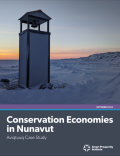Renewable energy offers Prince Edward Island (PEI) a local source of power that is competitive with imported power. Because the island has no fossil fuel reserves and no opportunities for hydroelectric power, electricity has always been expensive. Electricity imports are constrained by the capacity of the two submarine cables linking PEI with New Brunswick. PEI has the best wind capacity of any province in Canada.
PEI created an effective mechanism for renewables development in the form of the PEI Energy Corporation. This publicly-owned development model allowed the province to quickly create a wind-based energy sector. Instead of having to attract external private investors, it was possible to use provincial resources to demonstrate the viability of the concept. The Energy Corporation has been extremely successful in fundamentally reordering the electricity sector on the island in a short period of time.
This paper examines the experience in PEI, and proposes four main findings: i) Small, mainly rural territories can adopt innovative and effective renewable energy strategies that contribute to economic development; ii) Investment in renewables can be justified in terms of the power produced rather than any additional development impacts; iii) The publicly owned development model can stimulate investment in small economies with limited investment capital of their own; iv) Creating local investment opportunities and spreading renewable energy benefits locally helps to maintain local support for renewable energy deployment.

